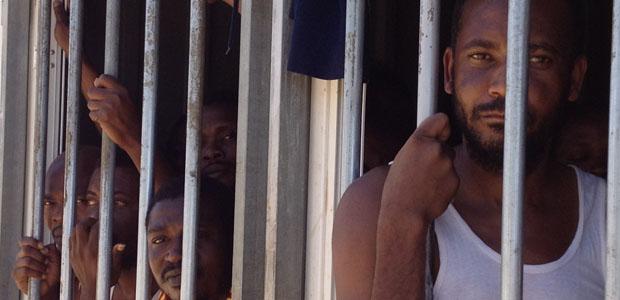Libya’s crackdown on illegal immigrants poses problems for that country’s economic recovery
Adallah Abduaziz, from Nigeria, was arrested in Libya this spring for not having proper documents to be in the country. He’s worked in Libya for the past 8 years in a cement factory and says he never had problems in the country before. (Photo by Mar
Nearly two million immigrants lived in Libya before the uprising last year, most there illegally.
Today, only about a half million foreign workers make their home in the North African country. And that’s a problem for Libya, which is trying to rebuild after last year’s revolution.
At Libya’s Building & Construction Exhibition, Ahmet Mojaat, the North African director at Mesa, a Turkish construction group, said the event marks his company’s return to business after a year and a half on hold.
“We want to restart our work because we are sure that there are projects here, and we have references and we will get a lot of work," he said.
Mojaat expects business to pick up after the elections in July, as Libya embarks on new public construction projects. But Mojaat’s not just scouting for government contracts; he needs foreign labor.
“Libya today needs a lot of workers,” he said, “so they must find solutions for them to stay here.”
Before the revolution, most construction workers in Libya were undocumented migrants from North African and sub-Saharan African countries. Many fled during last year’s uprising. Adallah Abduaziz, who’s from Nigeria, worked in a Libyan cement factory for eight years. But this spring, he was arrested because he lacked legal documents.
A post-revolution Libya has been cracking down on illegal immigration in contrast with Muammar Gaddafi’s laissez faire approach.
“None of us are here to sleep. We work,” Abduaziz said. “The Libyans need us here. We know we need them as much as they need us.”
Libya has a population of only about six million, so the country has depended on foreigners to fill jobs in farms, factories, hospitals and private homes. Jeremy Haslam, of the International Organization for Migration, said the labor shortage today is widespread.
“The migrant population represented about a third of the work force in Libya,” Haslam said. “It is not enough just to try and seal the borders and try and deny migrants crossing into Libya. They have to balance this need to meet the needs of the private sector for economic recovery of the country.
According to Libya’s interim Labor Minister Mustafa Rugibani, they’re trying to find that balance. He said authorities have issued more than 100,000 work permits, and are processing half a million visa applications – most for jobs that Libyans don’t want. But Rugibani points out that creating an effective immigration policy is challenging in a country emerging from 42 years of dictatorship.
“During Gaddafi, no one can talk about anything, including this subject,” Rugibani said. “But now people have freedom, they are practicing democracy and with all that, they talk on any subject and this is one of the hot subjects we have now.”
Rugibani said it’s getting easier for migrants to get work permits, but they still need to be sponsored by an employer. Critics say that doesn’t help day laborers and domestic workers, in high demand, who usually find jobs after they’ve entered the country illegally.
Becky, who’s 15, arrived in Tripoli in January. She found a job as a maid that pays $400 a month. Becky was sending half her earnings to her older sister back in Nigeria, but last month, she was arrested.
“They arrested me on the road and put me inside these useless containers,” Becky said, referring one of several metal containers that make up a makeshift detention facility. She’s here in the scorching heat with hundreds of other illegal immigrants, some of whom have been here for months.
Nekson, a Nigerian mason who’s been detained since January, said rounding up undocumented workers only to pack them in detention centers seems counter-productive. It would make more sense, he said, for Libya to let the migrants work or at least send them back home to warn others who might be heading to Libya.
“They believe that we are living well here,” Nekson said. “You send us back now so that we spread the news all over: Don’t go to Libya. The place is bad now for you as an illegal immigrant.”
But many observers say it’s unlikely such feedback would stem the flow of migrants, now that Libya’s economic prospects are looking up again.
